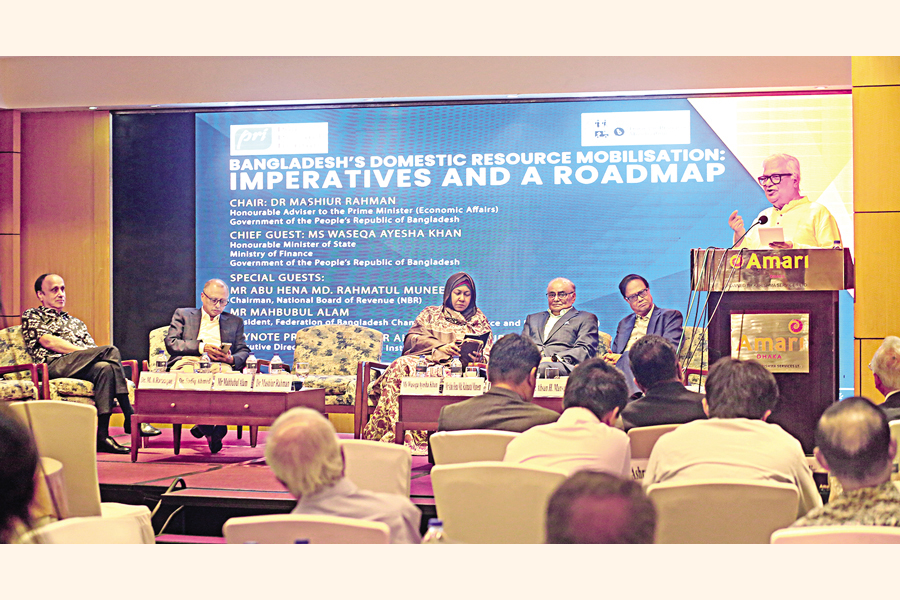
Published :
Updated :

Phasing out certain tax exemptions could generate an additional Tk 600- billion revenue in next four years while more extensive reforms are imperative, suggests a think-tank as way-out from debt-dependent development paradigm.
Currently, one-fourth of Bangladesh's tax revenue is being spent on subsidy payments while the rest on interest payments against loans, and salary and pensions for government officials, compelling the bearing of development expenditure with borrowed money, a PRI economist pointed out at its economic-reappraisal function held here Tuesday.
"The government has no fiscal space to allocate enough for health and education," said Dr Ahsan H Mansur, Executive Director of the Policy Research Institute (PRI), at the programme on 'Bangladesh's Domestic Resource Mobilisation: Imperatives and a Roadmap', organised by the PRI.
Dr Mansur feels increasing tax revenue is essential for stabilising the fiscal situation in the short term.
"Not implementing more widespread reforms will incur a revenue loss worth around Tk 50 trillion by the fiscal year ending 2041, goal set by government to become developed country," he said in a keynote paper presented for discussion.
The GDP growth could also be improved by 0.2 percentage points above current levels by raising domestic tax revenue by just 2.0 percentage points, said Mr Mansur, who had once served the IMF, the global monetary institution which is making much the same recommendations during an ongoing assessment mission in the country.
Dr Mashiur Rahman, adviser to the Prime Minister on economic affairs, chaired the programme where some other economists also spoke, predominantly on urgency of reforms.
State Minister for Finance Waseqa Ayesha Khan attended the programme as chief guest while National Board of Revenue Chairman Abu Hena Md Rahmatul Muneem, Federation of Bangladesh Chambers of Commerce and Industry (FBCCI) President Mahbubul Alam, Metropolitan Chamber of Commerce and Industry President Kamran T Rahman, Dhaka Chamber of Commerce and Industry (DCCI) president Ashraf Ahmed and Chairman of Chittagong Stock Exchange Asif ibrahim, among others, attended the programme.
Dr Mansur suggested the start of reform steps now and without delay to get result in the near future.
As a short-term reform measure, he recommended mobilising higher revenues through full-fledged automation of tax department.
He likens the country's low tax-to-GDP ratio to that of impoverished African countries like Congo, Somalia. "It's a shame."
Responding on the issue, the NBR chairman said economic perspectives of those countries are not similar to Bangladesh's as the local manufacturers need fiscal support here to grow.
Dr Mansur said higher dependence on indirect tax is the major flaw in the tax structure, fueling Income inequality.
He points out that private-sector- credit flow has shrunk due to higher government borrowing from banking system where treasury bill is offering 13-percent interest that may rise to 15 per cent this month.
Dr Mansur thinks government can mobilise three times higher revenue by keeping the existing tax rates unchanged if reform agenda implemented.
The economist suggests reinstatement of the original VAT law framed in 2012 to ease high tax burden on small businesses.
"Tax GDP would gradually fall unless the government brings reform. It would be difficult to become high- income country with tax-GDP ratio below 10 per cent," he told the meet.
Tax-revenue collection may reach Tk 29 trillion by 2041 without reform under existing pace while Tk 78 trillion could be mobilised with the reform, he said.
Speakers singled out political economy as a major factor in implementing reform agenda.
Dr Zaidi Sattar, Chairman of PRI, suggested a cut in reliance on trade taxes as it is affecting country's export competitiveness.
He notes that non-readymade-garment exporters are discouraged from exporting as prices and profits are higher in the domestic market.
"Country's export diversification is suffering as tariff policy has become a 'binding' constraint to this national priority goal," he added.
Dr Sadiq Ahmed, vice-chairman of PRI, views that excessive import control is not good for a economy, as it creates production and supply constraints.
"Let the market determine the exchange rates rather than controlling it," he said, implicitly suggesting deregulation of the current dollar-taka exchange regime.
The state minister for finance said prudent use of domestic revenue is major factor which is discussed less.
She also feels that time has come to end the tax benefits for those enjoying it for a longer period.
MCCI president Kamran T Rahman proposed that the government check tax evasion and bring reform in tax administration.
FBCCI president Mahbubul Alam sought uninterrupted supply of gas and electricity while the DCCI president sought tax breaks on energy if subsidies should be withdrawn.
Mr Ashraf Ahmed said tax exemption is required for some sectors given the higher cost of doing business.
Asif Ibrahim, Chairman of Chittagong Stock Exchange, said state-owned profitable companies like Matarbari can come to the capital market to provide credit support to the government.
Dr Mashiur Rahman said separation of tax policy from implementation may not bring expected result given the existing horizontal civil services.
He recommends cautious move to bring reform given the existing dearth of expertise.
The NBR chairman said a large part of the country's population, including in government and private sectors or individuals, are not willing to pay tax.
Mohammad Abdul Mazid, former chairman of the NBR, said political will is important to bring reform.
Dr MA Razzaque, Research Director of PRI, delivered welcome remarks at the event.
doulotakter11@gmail.com


 For all latest news, follow The Financial Express Google News channel.
For all latest news, follow The Financial Express Google News channel.